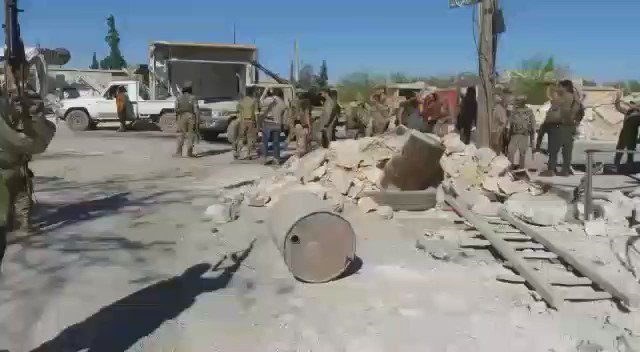LIVE UPDATES: The previous post in our Putin in Syria column can be found here.

Russia’s deputy foreign minister, Mikhail Bogdanov, has told the BBC that the Russian Air Force may resume strikes against rebel groups in Syria that are not affiliated with al-Qaeda.

Syria war: Russia says US must influence Syria rebels more – BBC News
Russia has warned it could resume air strikes on "moderate" rebel groups in Syria unless the US does more to distance them from extremists. A top official told the BBC there were "limits" to how long Russia, a key ally of the Syrian government, would wait.
Russian Deputy Foreign Minister Mikhail Bogdanov told the BBC his country was confident that Syria would honour the ceasefire agreement but had “more doubts about the opposition”.
He said the US needed to do more to persuade “moderate” rebel groups to disassociate themselves from Jabhat Fateh al-Sham, which is the strongest jihadist rebel group and is excluded from the ceasefire.
If the cessation holds for seven days, the US and Russia have agreed to jointly plan attacks on Jabhat Fateh al-Sham, which was previously known as al-Nusra, and IS.
However, other rebel groups, many of them Western-backed, have shown no sign of separating from Jabhat Fateh al-Sham, to which they are strategically allied in some areas.
The US “have been promising to do the maximum possible to separate the moderate opposition from the Nusra Front since February”, when a previous cessation of hostilities deal was agreed, said Mr Bogdanov.
Since then, the US had been saying “just hold on”, he said. “We’re waiting, but there are limits,” the Russian official added.
Mr Bogdanov said the current deal was “the only plan on the table”. “We have no Plan B,” he said.
The Russian state-owned TASS news agency reports that the Kremlin is prepared to extend the “truce” in Syria by another 72 hours, but that this would depend on cooperation from the United States.
Viktor Poznikhir, head of the Main Operations Department of the Russian General Staff, said today that Russia was waiting for the US to “take decisive measures on influencing the armed groups under their control.”
The Russian military claims that rebel fighters of are continuing to violate the ceasefire while regime and Russian forces are refraining from any attacks.
But while Poznikhir announced yesterday that Russian and Syrian regime jets had stopped bombing any areas where rebel units could possibly be located, and that the regime had begun withdrawing tanks and other heavy weaponry, reports from Syria reveal this is a complete falsehood.
The Syrian Local Coordination Committees (LCC) and Syrian Civil Defense (the White Helmets) both report multiple air strikes on areas held by rebel forces within the last 24 hours.
A Syrian Civil Defense center in al-Tamanah, Idlib, was bombed last night:
This afternoon, the LCC reported that regime jets had conducted four airstrikes, using thermobaric weapons, on nearby Khan Shaykhun, killing three civilians, two of them children, and wounding several others.
Airstrikes were also reported in the Aleppo area, despite the pretence of a humanitarian operation under the auspices of the Russian military.
The LCC report that Russian jets bombed the western al-Jinah suburb with thermobaric weapons.
Four children were, the LCC report, killed when unidentified warplanes bombed Deir Hafir, Abu Sosa and Tabara this morning.
There were also regime air strikes on the rebel-held Damascus suburb of Jobar:
As we reported earlier, Turkish Deputy Prime Minister Mehmet Simsek was proud of the U.S. presence in Al-Rai. Could this be a sign that the FSA has been pressured by the Turkish government to accept the U.S. soldiers?
Either way, there are clearly tensions between the U.S. and many rebel groups, even moderates, over the U.S. support of the Kurdish YPG.
Lister has additional comment:

I spoke to Mehmet Şimşek, Turkey’s Deputy Prime Minister, who is attending the YES conference in Kiev, Ukraine.
Şimşek confirmed that U.S. special forces have travelled via helicopter to positions near the Syrian border. Those forces have since moved to Al Ra’i and will likely push south to the strategically-crucial crossroad town of Al-Bab. According to Şimşek, it is not enough that Islamic State no longer has a presence on the Turkish border, but also to push them further from Turkey in order to prevent terrorist attacks on Turkish soil.
This confirms other reports, such as the one originally caried by the Russian propaganda outlet Sputnik, that 29 U.S. special forces officers had crossed into Turkey. Şimşek said that pictures posted by Hurriyet showed the U.S. servicemen, though The Interpreter has yet to verify this image.

ABD özel kuvvetleri ile ÖSO arasında gerilim
Bu sabah helikopterle bölgeye gelen ABD'li askerleri, Türk askerleri ile ÖSO savaşçıları karşıladı. ABD'li askerlerin zırhlı araçları da Öncüpınar Sınır Kapısı'ndan Çobanbey (El Rai) kasabasına getirildi. Sputnik'in haberine göre, Çobanbey kasabasına gelen 29 ABD askeri, ÖSO tarafından protesto edildi. Protestoda gerginlik çıkarken, ABD askerleri kasabadan ayrılarak Türkiye'ye dönmek zorunda kaldı.

US officers who were invited to al-Ra'i by Turkey were kicked out by FSA militants chanting anti-US slogans
Civil war and Russian intervention in Syria

The Syrian Kurds Could Be A Key Ally In The Fight Against Islamic State
QAMISHLI, Syria — The Kurds have never been lucky with geography, being landlocked and divided between Iran, Iraq, Syria, and Turkey. However, due to the Syrian crisis and the threat of an Islamic caliphate bordering Kurdish areas in Syria, the Syrian Kurds have become one of the most reliable coalition allies against the Islamic State (IS) militant group.
Şimşek also reiterated that Turkey considers the YPG to be part of the PKK, a terrorist organization that is not tolerated by Turkey.
— James Miller
